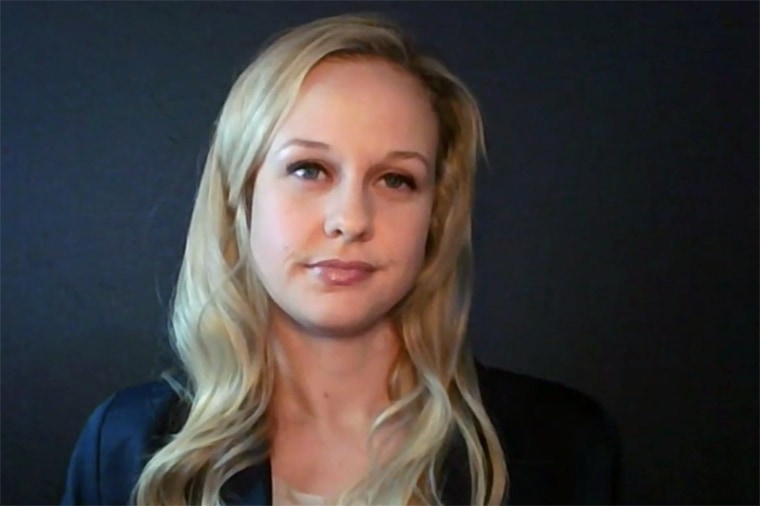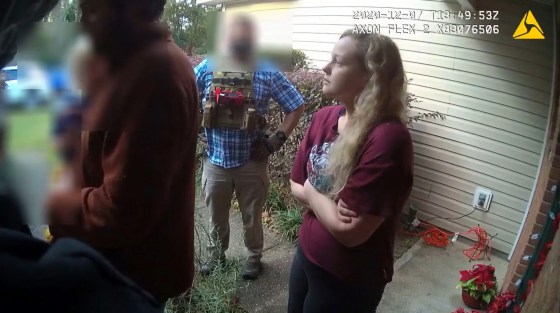A prominent critic of Florida Gov. Ron DeSantis’ Covid response made “unsubstantiated” and "unfounded" claims that state health officials had fired her because she refused to present manipulated data online, according to an inspector general’s report obtained by NBC News on Thursday.
The 27-page report from the Florida Department of Health’s Office of Inspector General said it found "insufficient evidence" or no evidence to support Rebekah Jones' accusations that she was asked to falsify Covid positivity rates or misrepresent them on the state’s dashboard she helped design. The report also "exonerated" officials accused by Jones of wrongdoing because they removed a data section from the website to ensure that private individual health information was not released publicly.
The independent report paints a portrait of an employee who did not understand public health policy or the significance of epidemiological data, did not have high-level access to crucial information and leveled claims that made professional health officials "skeptical."
The report did not examine one of Jones’ most explosives claims: that Florida intentionally hid deaths to make the pandemic seem less deadly.
That conspiracy theory, which Jones alternately promoted and recanted on Twitter before her account was suspended for violating the platform’s terms of service, has persisted on social media for more than a year, despite the lack of evidence. The Florida Democrat who ran the state’s emergency response at the time bemoaned how Jones spread “disinformation.” Independent epidemiologists say the claim has no basis.
Jones, who parlayed her Twitter and media fame into fundraising success, is now a Democratic congressional candidate challenging Republican Rep. Matt Gaetz in Florida’s Panhandle, where she moved to run against him.
Jones was widely hailed as a “whistleblower” after the Department of Health Inspector General last year determined she met the minimum criteria for whistleblower protections under state law as it conducted this investigation, which has now found no substantiation for her claims of wrongful termination in May 2020.

But her attorney, Rick Johnson, maintains that his client is still a "whistleblower" and said that she will still press her claim of wrongful termination in court. He said the investigative report governs the actions of state workers and does not affect her rights or ability to sue for wrongful termination in court.
"It's simple: She was fired for refusing to manipulate Covid data," Johnson said, noting that his client had issued a lengthy rebuttal to the department earlier this year when it released its initial findings, which were confidential.
Johnson also accused the Florida Commission on Human Relations, which has to review her wrongful termination claim before she can go to court, of slow-walking the case for political reasons as DeSantis runs for a second term this November.
"They're not going to do anything until after the election," Johnson said.
A spokeswoman for DeSantis, Taryn Fenske, said the claim was "the latest absurd allegation from a discredited conspiracy theorist."
Another DeSantis spokeswoman, Christina Pushaw, has a long-running feud with Jones after writing a 2021 article for the conservative Human Events publication titled "The 'Florida Covid-19 Whistleblower' Saga Is a Big Lie." DeSantis hired Pushaw shortly after the article ran.
In response, Jones filed a restraining order against Pushaw and then falsely suggested Pushaw violated it.
Jones faces a felony charge for allegedly accessing and downloading confidential health department data following her termination for insubordination. She also has an unrelated misdemeanor stalking charge tied to an affair she had with a former student, which led to her dismissal as a Florida State University teacher.
As Jones gained fame and notoriety in the news media in 2020, DeSantis bristled at her accusations and noted her termination from FSU.
“I’ve asked the Department of Health to explain to me how someone would be allowed to be charged with that and continue on,” DeSantis told reporters. “I have a zero-tolerance policy for sexual harassment.”
DeSantis also criticized reporters for calling Jones “a data scientist” because she operated as a website and dashboard designer for the state. Jones is not an epidemiologist.
Under DeSantis, however, the state routinely slow-walked public records requests and hid some data in the early months of the pandemic. DeSantis was also criticized for reopening the state even as epidemiologists urged a slower approach.
Florida became one of the first states to widely reopen in 2020, making DeSantis a lightning rod for controversy that catapulted him onto the national stage — along with Jones’ allegations, which he said were echoed by critics because “they’ve got to try to find a boogeyman. Maybe it’s that there are black helicopters circling the Department of Health. If you believe that, I’ve got a bridge in Brooklyn I’d like to sell you.”
After Florida reopened in the summer of 2020, cases and deaths jumped. But by the early winter of 2021, Florida’s death rate was in the middle of the pack, below states like New York but higher than California’s. Since the introduction of vaccines, Florida has had a higher death rate than many other states, which officials attribute to its large elderly population and which critics blame on widespread anti-vaccine attitudes, especially among conservatives.
The inspector general's report, which interviewed 17 current and former health department officials, was triggered by Jones when she filed her wrongful termination complaint in July 2020 with the Florida Commission on Human Relations and alleged wrongdoing by Department of Health officials. The commission in January 2021 referred the allegations of official misconduct to the state's chief inspector general, who then referred it to the department's inspector general, which must investigate such allegations to determine their credibility.
The inspector general examined four separate allegations made by Jones, three concerning Covid positivity rates and one concerning downloadable data sets that listed individual Covid cases.
Beyond the four specific allegations of official wrongdoing, the report said that other complaints she made concerning Florida’s Covid response “conflict with the totality of the information obtained during the OIG investigation.”
The principal targets of Jones’ accusations — Dr. Shamarial Roberson, Dr. Carina Blackmore and Courtney Coppola — all denied the accusations that Jones or staff were directed to falsify Covid positivity rates online to justify reopening the state. Colleagues of Jones indicated that she didn’t know what she was talking about, and they were “skeptical” of her claims, the report said.
“Complainant was not an epidemiologist and did not have system access to underlying COVID-19 data in Merlin and ESSENCE,” the report noted, referring to the state’s restricted health data systems.
Officials said it would make no sense to falsify data online anyway because, ethics aside, it would have been instantly discovered as the world watched Florida.
“If the complainant or other [Department of Health] staff were to have falsified COVID-19 data on the dashboard, the dashboard would then not have matched data in the corresponding final daily report,” the report noted. “Such a discrepancy would have been detectable by [Bureau of Epidemiology] staff conducting data quality assurance, as well as other parties, both within and outside the DOH, including but not limited to [County Health Departments], local governments, researchers, the press/media, and the general public.”
In two of these cases, investigators said there was insufficient evidence to support her claims and determined her allegations were "unsubstantiated."
The report also found that Jones made an "unfounded" claim that the state changed its Covid positivity calculation with nefarious intent. But the experts interviewed indicated she didn’t understand how it was formulated, and Jones got her facts wrong, the report said.
“DOH never calculated the rates of positivity in the manner alleged by the complainant,” the report said. "Based upon an analysis of the available evidence, the alleged conduct, as described by the complainant, did not occur."
It wasn’t the only time that Jones misrepresented data. Early on in the pandemic, she launched a Twitter attack on former University of Florida epidemiologist Natalie Dean for correctly pointing out that Jones didn’t understand the difference between antigen and antibody tests.
Jones also savaged University of South Florida epidemiologist Jason Salemi on Twitter — and temporarily drove him off the platform because of the attacks from her followers — when he, like Dean, discounted Jones claims about Florida hiding Covid death data.
“The widespread notion that the Florida Department of Health is ‘cooking the books’ on COVID data is unsupported and unhelpful," Dean wrote in a March 2021 tweet. "If we aim to have a real conversation about Florida, folks need to move past this.”

